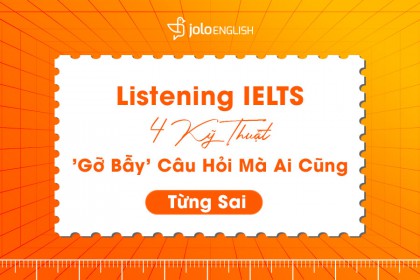Government & Politics là 1 topic rất khó và phức tạp trong bài thi IELTS (đặc biệt là Writing và Speaking). Ở bài viết này, JOLO sẽ giúp bạn bổ sung các từ vựng cần thiết nhất để chinh phục topic khó nhằn này:

1. Câu Hỏi Mẫu Chủ Đề Government & Politics
Trước tiên, Bạn có thể tham khảo một số câu hỏi IELTS Writing Task 2 sau để xem Government & Politics có nội dung như thế nào.
- Some believe that politicians are the most influential people in the world, while others believe scientists are the most influential. Which side do you agree with and why? Provide specific reasoning for your answer.
- Should governments make decisions about people's lifestyle, or should people make their own decisions?
- A government has a responsibility to its citizen to ensure their safety. Therefore, some people think that the government should increase spending on defense but spend less on social benefits. To what extent do you agree?
- Some people think that only the politicians can make significant changes in society, while others think that individuals can have a lot of influence. What is your opinion?
- It is impossible to help all people in the world, so governments should focus on people in their own countries. To what extent do you agree or disagree?
Chủ đề này cũng có thể xuất hiện trong phần thi IELTS Speaking Part 2:
Describe a leader or a politician whom you admire.
You should say:
- who he/she is/was
- what so appealing is about him/her
- what type of leader or politician he/she is/was and explain why do you admire him /her.
Bạn lưu ý rằng IELTS là bài thi kiểm tra kỹ năng Tiếng Anh chứ không phải để kiểm tra kiến thức xã hội của bạn. Do đó, đề bài sẽ không bắt bạn phải phân tích chuyên sâu về một đề tài Chính trị nào đó, mà chỉ hỏi về những vấn đề mang tính tổng quát. Bạn chỉ cần trang bị cho mình đủ số từ vựng để có thể diễn đạt các ideas của mình một cách chính xác và có tính học thuật là được.
2. Những từ vựng chủ đề Government & Politics cần biết
Các từ vựng đơn lẻ:
- alysum (n): tị nạn chính trị
- ballot (n): bỏ phiếu kín
- bipartisan (adj): có sự liên quan của cả 2 đảng chính trị
- Bleeding Heart (n): một thuật ngữ để chỉ những người ủng hộ chính phủ chi tiêu mạnh tay cho các vấn đề và dự án xã hội
- campaign (n): chiến dịch tranh cử
- Civil liberty (n): quyền tự do của công dân
- coalition (n): sự liên minh
- constitution (n): hiến pháp
- Checks and Balances (n): hệ thống phân chia chính phủ thành 3 nhánh Hành pháp, Lập pháp và Tư pháp để đảm bảo không bên nào nắm giữ quá nhiều quyền lực
- Democracy (n): chế độ dân chủ
- dictatorship (n): chế độ độc tài
- dissolution (n): sự giải thể
- election (n): sự bầu cử
- electorate (n): khu cử tri
- to enforce a rule: thực thi một đạo luật
- Fishing Expedition (n): thuật ngữ ám chỉ việc đảng này săm soi, điều tra để tìm kiếm những việc xấu của đảng còn lại để bêu riếu, hạ bệ
- front burner (n): thuật ngữ chỉ sự tập trung cao độ để giải quyết một vấn đề cấp bách
- gerrymander (n): sự dàn xếp kết quả bầu cử
- grass roots (n): các hoạt động chính trị liên quan đến người dân thường
- human rights (n): quyền con người
- incumbent (n): người đương nhiệm
- lobby (v): vận động hành lang
- Lame Duck (n): thuật ngữ ám chỉ một người đương nhiên nhưng đang bước vào giai đoạn mãn nhiệm kỳ và mất dần quyền lực
- Monarchy (n): chế độ quân chủ
- Muckraker (n): thuật ngữ ám chỉ những nhà báo chuyên đi săn lùng scandal của giới chính trị
- nominee (n): ứng cử viên
- opposition (n): phe đối lập
- policy (n): chính sách
- politician (n): chính trị gia
- poll (v): bỏ phiếu
- polling station (n): địa điểm bỏ phiếu
- Prime minister (n): thủ tướng
- Photo-Op (n): viết tắt của Photo Opportunity, những sự kiện đại chúng giúp phóng viên lấy tin bài về các chính trị gia để đưa lên báo chí, truyền thông
- Political Suicide (n): thuật ngữ ám chỉ những hoạt động bất thường, trái với ý muốn cử tri, có thể khiến chính trị gia thua cuộc trong chiến dịch tranh cử
- regime (n): thể chế, chế độ
- republic (n): nền cộng hoà
- run for election: tranh cử, chạy đua bầu cử
- red tape (n): thuật ngữ ám chỉ các thủ tục hành chính và quy trình công vụ cực kỳ chậm chạp và khó khăn của chính phủ
- Rubber Chicken Circuit (n): thuật ngữ ám chỉ các bữa tiệc, các buổi chiêu đãi mà chính trị gia phải tham dự và phát biểu trong thời gian tranh cử
- Spin doctor (n): phát ngôn viên của một Đảng phái, người tạo ra lợi thế truyền thông bằng cách đưa ra các thông tin có lợi cho đảng của mình
- Whistle-Stopping (n): thuật ngữ chỉ quãng thời gian ngắn dành chính trị gia để luyện tập các bài phát biểu, thường là trong quá trình di chuyển, đi tàu/máy bay tới các sự kiện công chúng tiếp theo
Các cụm từ hữu ích:
- create/form/be the leader of a political party: hình thành/trở thành người lãnh đạo của một đảng phái chính trị
- gain/take/win/lose/regain control of Congress: giành được/thắng được/mất/giành lại quyền kiểm soát Quốc hội
- start/spark/lead/be on the brink of a revolution: khơi mo/châm ngòi/lãnh đạo/đứng trên bờ vực của một cuộc cách mạng
- be engaged/locked in an internal power struggle: tham gia/kẹt giữa một cuộc tranh giành quyền lực nội bộ
- lead a rival: dẫn dắt phe đối lập
- form a breakaway faction: thành lập phe ly khai
- seize/take control of the power: giành được/chiếm lấy quyền kiểm soát quyền lực
- bring down/overthrow the government/regime: hạ bệ, lật đổ chính quyền/chế độ
- abolish/overthrow/restore the monarchy: bãi bỏ/lật đổ/khôi phục chế độ quân chủ
- establish/install a stable government: thành lập/thiết lập một chính phủ bền vững
- be removed from office/power: bị cách chức
- resign/step down as...: từ chức khỏi một vị trí nào đó
- enter/retire from/return political life: bước vào/nghỉ hưu/quay lại sự nghiệp chính trị
- spark/ provoke a heated/hot/intense debate: khơi mào/kích động một cuộc tranh cái nảy lửa/nóng hổi/quyết liệt
- launch/start/lead a campaign/movement: khởi động/bắt đầu/dẫn dắt một chiến dịch/động thái
- join/be linked with the peace/anti-war/feminist/civil rights movement: tham gia/có liên quan đến phong trào hoà bình/nữ quyền/quyền con người
- criticize/speak out against/challenge/support the government: chỉ trích/lên tiếng phản đối/thách thức/ủng hộ chính quyền
- put pressure on the government (to do something): gây áp lực lên chính phủ để yêu cầu làm việc gì đó
- come under fire/pressure from opposition parties: chịu sự chỉ trích/áp lực từ đảng đối lập
- call for/demand/propose/push for/advocate democratic/political/land reform(s): kêy gọi/yêu cầu/đề xuất/thúc đẩy/xung phong cải cách dân chủ/chính sách/đất đai
- formulate/implement domestic economic policy: xây dựng/thực thi chính sách kinh tế trong nước
- change/shape/have an impact on government/public policy: thay đổi/định hình/gây ảnh hướng đến chính phủ/chính sách công
- be consistent with/go against to government policy: nhất quán/đi ngược với chính sách của chính phủ
- reform/restructure/modernize the tax system: tái thiết/tái cấu trúc/cải cách hệ thống thuê
- privatize/improve/make cuts in/deliver public services: tư nhân hoá/cải thiện/cắt giảm/đem lại các dịch vụ công
- invest in/spend something on schools/education/public services/(the) infrastructure: đầu tư/rót tiền vào trường học/giáo dục/dịch vụ công/cơ sở hạ tầng
- nationalize the banks/the oil industry: quốc hữu hoá ngân hàng/công nghiệp dầu khí
- promise/ propose/give (3 billion VN in/significant/massive) tax cuts: hứa hẹn/đề xuất/thực hiện cắt giảm 3 tỉ/một lượng đáng kể/một lượng khổng lề tiền thuế
- propose/sponsor a bill/legislation/a resolution: đề xuất/tài trợ cho một dự luật/luật/nghị quyết
- introduce/bring in/draw up/draft/pass a bill/a law/measures: giới thiệu/đem tới/xây dựng/phác thảo/thông qua một dự luật/điều luật/biện pháp
- amend/repeal an act/legislation: sửa đổi/huỷ bỏ một động thái/đạo luật
- veto/vote against/oppose a bill/legislation/a measure/a proposal/a resolution: huỷ bỏ/biểu quyết chống lại/phản đối một dự luật/điều luật/biện pháp/đề xuất/giải pháp
- get/require/be decided by a majority vote: có được/cần đến/được phủ quyết bởi đa số phiếu bầu
3. Bài mẫu chủ đề Government & Politics
Sau đây là một số bài mẫu Writing và Speaking Band 9 về chủ đề Government & Politics để bạn tham khảo cách ứng dụng của các từ vựng nêu trên.
Bài Mẫu IELTS WRITING:
- Bài Mẫu 1: A government has a responsibility to its citizen to ensure their safety. Therefore, some people think that the government should increase spending on defense but spend less on social benefits. To what extent do you agree?
The primary role of the state is to protect its citizens (công dân) from different types of threat. Therefore, some people argue that the government should direct much of its financial resources to the defense sector (lĩnh vực quốc phòng) and cut down the spending on social welfare (phúc lợi xã hội). I do not agree with this view. In my opinion, a country has to spend on both social welfare and defense.
There is no denying the fact that a powerful military can ensure the safety of the citizens and maintain peace in a country. A strong military deters (ngăn cản) aggressive neighbours or terrorists from attacking a country and thereby prevents the loss of innocent lives and property. Moreover, in some countries, military can help with law enforcement (thực thi luật pháp) and promote political stability (sự ổn định chính trị) by maintaining the sovereignty (quyền lực tối cao) of the government. Therefore, it is crucial for a government to allocate a sufficient (vừa đủ) amount of funding to the defense sector.
However, the spending on military cannot be at the expense of social spending because the social welfare is as critical as military might for a country to thrive (phát triển). The government is responsible to ensure that all the people can satisfy their basic human needs such as food, shelter and health care. By providing welfare for the neediest members of the society through various schemes, the state can improve their living standards and make its people happy and contented (hài lòng). If there were no social benefit programs such as retirement schemes (chế độ hưu trí), disability benefits (trợ cấp cho người khuyết tật) or subsidized housing (nhà ở xã hội), the vulnerable sections of the society would suffer. This can lead to resentment (sự phẫn nộ) among the disadvantaged sections of the society and social uprising against the authorities. Moreover, citizens are entitled to receive benefits because they pay taxes to the government. Nowadays, only those countries which put great importance on social security can prosper. For example, Canada is a thriving country whose citizens enjoy almost free healthcare.
In conclusion, the state should give as much importance to the welfare of the citizens as to their safety and it will do more harm than good if it reduces the spending on social welfare for increasing military expenditure.
- Bài mẫu 2: It is impossible to help all people in the world, so governments should focus on people in their own countries. To what extent do you agree or disagree?
Some people believe that we should not help people in other countries as long as there are problems in our own society. I disagree with this view because I believe that we should try to help as many people as possible.
On the one hand, I accept that it is important to help our neighbours and fellow citizens. In most communities there are people who are impoverished (nghèo khó) or disadvantaged in some way. It is possible to find homeless people, for example, in even the wealthiest of cities, and for those who are concerned about this problem, there are usually opportunities to volunteer time or give money to support these people. In the UK, people can help in a variety of ways, from donating clothing to serving free food in a soup kitchen. As the problems are on our doorstep, and there are obvious ways to help, I can understand why some people feel that we should prioritise local charity.
At the same time, I believe that we have an obligation (nghĩa vụ) to help those who live beyond our national borders. In some countries the problems that people face are much more serious than those in our own communities, and it is often even easier to help. For example, when children are dying from curable diseases (bệnh có thể chữa được) in African countries, governments and individuals in richer countries can save lives simply by paying for vaccines that already exist. A small donation to an international charity might have a much greater impact than helping in our local area.
In conclusion, it is true that we cannot help everyone, but in my opinion national boundaries should not stop us from helping those who are in need.
Bài Mẫu IELTS SPEAKING
Describe a leader or a politician whom you admire.
You should say:
- who he/she is/was
- what so appealing is about him/her
- what type of leader or politician he/she is/was
- and explain why do you admire him /her.
As a nation, we are proud to have many legendary and visionary (có tầm nhìn) leaders who had shaped our fortune and devoted their lives and time to build the country. Among those impressive leaders and politicians, I would pick (...say a famous leader's name...) as my most favourite leader whom I really admire and respect.
He is such a popular and beloved leader that I have found that most of the people like and admire him. He possesses a very high political position with really immense power and yet he has chosen to lead such an ordinary and poor life that it is possible only by a dedicated, honest, good-hearted and completely honest leader. While he could have made a great fortune and could have exercised his power like many other politicians and leaders, he has chosen the honesty, integrity, responsibility and truth as his virtues.
The most appealing part about him is his honesty and fierceness (sự quyết liệt) for the truth and just. He does not fear anyone as long as it is to establish the just and right. Because of his invaluable contribution and dedication to many positive changes have been made in our country. I, like many others, like him because of his honesty, truthfulness, and fight for justice, dedication, patriotism, and benevolent attitude to the poor people. He is a rare politician in this era of corruption and selfishness. The world needs more leaders like him to make it a better place.
I am sure with his contribution our nation will progress further. The vision and leadership quality of this politician would inspire the young party members to contribute towards the betterment of the nation.
Hi vọng sau bài viết này của JOLO, bạn sẽ cải thiện được vốn từ của mình với các từ vựng chủ đề Government & Politics. Chúc bạn đạt kết quả cao trong kỳ thi IELTS sắp tới!
-----------------------------------------
Tìm hiểu thêm các khóa học tại GLN / JOLO English - Hệ Thống Trung Tiếng Anh và Luyện Thi IELTS uy tín nhất tại Hà Nội và HCM :
- Khóa học Luyện Thi IELTS tại Hà Nội và HCM
- Khóa học Tiếng Anh Giao Tiếp tại Hà Nội và HCM
- Khóa học Tiếng Anh cho trẻ em
Hệ Thống Trung Tâm Anh Ngữ GLN / JOLO:
- Hà Nội: (024) 6652 6525
- TP. HCM: (028) 7301 5555
- JOLO: Số 4, ngõ 54 Nguyễn Thị Định, Hà Nội
- JOLO: Số 27 Trần Đại Nghĩa, Hà Nội
- JOLO: Biệt thự B8, ngõ 128 Thụy Khuê, Hà Nội
- JOLO: Số 7, đường số 2, Cư Xá Đô Thành, Q.3, Tp.HCM
- JOLO: Số 2, tầng 1, tòa C2, Vinhomes Central Park, Q. Bình Thạnh, TP.HCM
- GLN: Tầng 1 & 12, Tòa nhà Handico Phạm Hùng, Mễ Trì, Từ Liêm, Hà Nội
- GLN: Tầng 1 & 8, Tòa nhà Coalimex 33 Tràng Thi, Hoàn Kiếm, Hà Nội






















